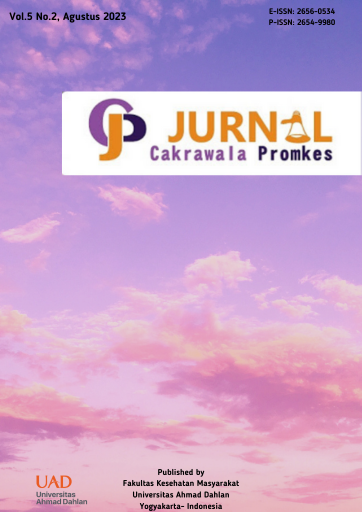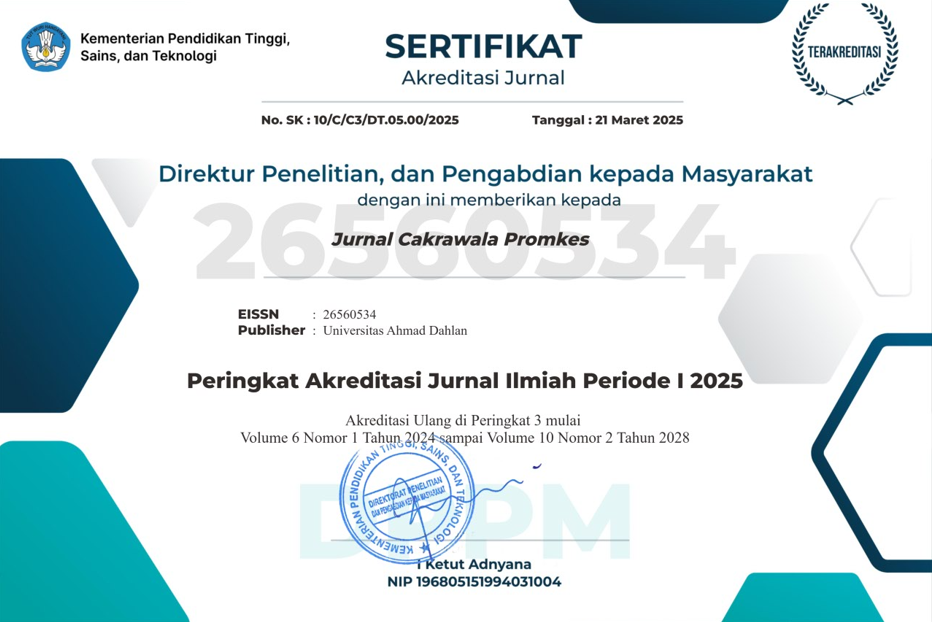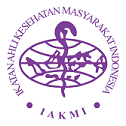Development community participation questionnaire to understand the factors that influence Covid-19 booster vaccination in Yogyakarta, Indonesia
DOI:
https://doi.org/10.12928/promkes.v5i2.7731Keywords:
Booster Covid-19, Immunization, Questionnaire, Reliability, ValidityAbstract
Covid-19 has resulted in fatalities and property losses not just in Indonesia but across the globe. Indonesia has the second-highest number of Covid-19 cases in Southeast Asia. The government has attempted several efforts, including vaccination. The enormous impact of vaccination in preventing illness, disability, and even death from diseases that can be prevented by immunization has been documented throughout history. The goal of COVID-19 immunization is to prevent the spread of COVID-19, lessen COVID-19-related morbidity and mortality, create community-wide herd immunity, and protect individuals against COVID-19. Achievement of booster vaccinations in the work area of PHC Playen 1 is only 41%; there is a gap of 9% from the target. This research aims to create assessment tools to identify the variables that may affect community involvement in the COVID-19 booster immunization program. Making a legitimate and trustworthy questionnaire to determine the factors that influence community participation in booster vaccinations in the working area of UPT PHC Playen 1 is the research's unique goal. This study uses a cross-sectional research design and is descriptive. The research was conducted in October 2022. Questionnaires were distributed to pre-selected respondents using the purposive random sampling method. Testing the validity and reliability of the questionnaire requires a sample of 30 people from the PHC Playen 1's working area to make up the sample. The questionnaire had five sections: the respondent's sociodemographic, their willingness, their level of knowledge, the regulation of booster vaccinations, and the community's access to booster immunization services. The data were validated and verified employing Cronbach Alpha score of 0.861 and a Pearson correlation test result showing that each statement item was valid and trustworthy by having a correlation value of higher than 0.361. Thus, this questionnaire could be employed in other related research.
References
Adams SH, Schaub JP, Nagata JM, Park MJ, Brindis CD, Irwin CE. Young Adult Perspectives on COVID-19 Vaccinations. JAdolesc Health. 2021;69:511–4.
Zhang K, Fang Y, Chan PS, Cao H, Chen H, Hu T, et al. Behavioral Intention to Get a Booster Dose of COVID-19 Vaccine among Chinese Factory Workers. Int J Environ Res Public Health. 2022;19.
Singh A, Khillan R, Mishra Y, Khurana S. The Safety Profile of COVID-19 Vaccinations in the United States. Am J Infect Control. 2022;50:15–9.
Kemenkes RI. ). Surat Edaran Nomor:HK.02.01/1/2007/2021 Tentang Vaksinasi Covid-19 Dosis Lanjutan (Booster). 2022.
Chencula S, Karunakaran P, Sharma S, Chavan M. Current Evidence on Efficacy of COVID-19 Booster Dose Vaccination against the Omicron Variant: A Systematic Review. J Med Virol. 2022;94:2969–76.
Wirawan GBS, Harjana NPA, Nugrahani NW, Januraga , P.P. Health Beliefs and Socioeconomic Determinants of COVID-19 Booster Vaccine Acceptance: An Indonesian Cross-Sectional Study. Vaccines (Basel). 2022;10(724).
Paul E, Fancourt D. Predictors of uncertainty and unwillingness to receive the COVID-19 booster vaccine: An observational study of 22,139 fully vaccinated adults in the UK. Lancet Reg Health Europe. 2022;14.
Qin C, Wang R, Tao L, Liu M, Liu J. Association Between Risk Perception and Acceptance for a Booster Dose of COVID-19 Vaccine to Children Among Child Caregivers in China. Front Public Health. 2022;10(68).
Kemenkes RI. Keputusan Menteri Kesehatan Republik Indonesia Nomor HK.01.07/Menkes/9806/2020 Tentang Penetapan Jenis Vaksin Untuk Pelaksanaan Vaksinasi Corona Virus Disease 2019. 2020.
Kemenkes RI. Keputusan Menteri Kesehatan Republik Indonesia Nomor HK.01.07/Menkes/4638/2021 Tentang Petunjuk Teknis Pelaksanaan Vaksinasi Dalam Rangka Penanggulangan Pandemi Corona Virus Disease 2019 (COVID-19). 2021.
Dinas Kesehatan Kabupaten Gunungkidul. Laporan Capaian Vaksinasi Dosis 1,2 dan 3. Kabupaten Gunungkidul. 2022.
Puskesmas Playen II. Profil Puskesmas Playen II. Gunungkidul; 2021.
Dahlan S. Pintu Gerbang Memahami Epidemiologi, Biostatistik, dan Metode Penelitian. 2nd ed. Jakarta: PT. Epidemiologi Indonesia; 2018.
Notoatmodjo S. Metodologi Penelitian Kesehatan . Bandung: PT.Rineka Cipta; 2002.
Dahlan S. Besar Sampel Dalam Peneltian Kedokteran dan Kesehatan . 5th ed. Jakarta: PT. Epidemiologi Indonesia; 2020.
Budiarto E. Biostatistik Untuk Kedokteran dan Kesehatan Masyarakat . Jakarta: EGC; 2001.
Nuryani. Validitas dan Reliabilitas Kuesioner Pengetahuan, Sikap dan Perilaku Gizi Seimbang Pada Remaja. Jurnal Gizi dan Kesehatan. 2019;3(2):37–46.
Yadete T, Batra K, Netski D, Antonio S, Patros M, Bester J. Accessing Acceptabilty of Covid-19 Vaccine Booster Dose among Adult Americans. 2021.
Balan A, Bejan I, Bonciu S, Eni. Romanian Medical Students Attitude Towards and Perceived Knowledge on Covid-19 Vaccination. 2021;
Folcarelli L, Miraglia D, Corea F, Angelillo I. Intention to Receive the Covid-19 Vaccine Booster Dose in University Community in Italy. . 2022;10(2).
Ma L, Yang J, Zhang T, Huang Q, Yang Y. Willingness Toward Covid-19 Vaccination, Coadministration with Other Vaccines and Receive a Covid-19 Vaccine Booster. 2022.
Ngambut K. Pengantar Biostatistik (Aplikasi Penggunaan SPSS). Yogyakarta: Gosyen Publishing; 2011.
Dahlan S. Langkah-Langkah Membuat Proposal Penelitian Bidang Kedokteran dan Kesehatan . 5th ed. Jakarta: Sagung Seto; 2018.
Wong LP, Alias H, Siaw YL, Muslimin M, Lai LL, Lin Y, et al. Intention to receive a COVID-19 vaccine booster dose and associated factors in Malaysia. Hum Vaccin Immunother. 2022;18.
Sonderskov KM, Vistisen HT, Dinesen PT, Ostergaard SD. positive update on COVID-19 booster vaccine willingness among Danes. Dan Med J. 2022;69.
Jairoun AA, Al-Hemyari, el Dahiyat, Shahwan M, Al-Ani M, Habeb M, et al. Assessing Public Knowledge, Attitudes and Determinants of Third COVID-19 Vaccine Booster Dose Acceptance: Current Scenario and Future Perspectives. JPharm Policy Pract. 2022;15(26).
Notoadmodjo S. Promosi Kesehatan dan Perilaku Kesehatan. Jakarta: Rineka Cipta; 2014.
Dahlan S. Statistik Untuk Kedokteran dan Kesehatan: Deskriptif, Bivariat dan Multivariat Dilengkapi Aplikasi Menggunakan SPSS . 6th ed. Jakarta: PT.Epidemiologi Indonesia; 2020.
Yusup F. Uji Validitas dan Reliabilitas. Jurnal Tarbiyah: Jurnal Ilmiah Kependidikan. 2018;7(1).
Ghazali I. Aplikasi analisis multivariate dengan program IBM SPSS 25. Semarang: Badan Penerbit Universitas Diponegoro; 2018.
Downloads
Published
Issue
Section
License
Copyright (c) 2023 Kuncoro Kuncoro, Ezi Emira, Eka Kurnia Sari, Nurul Kodriati, Sitti Nur Djannah

This work is licensed under a Creative Commons Attribution-ShareAlike 4.0 International License.
Authors who publish with JCP: Jurnal Cakrawala Promkes agree to the following terms:
- Authors retain copyright and grant the journal the right of first publication with the work simultaneously licensed under a Creative Commons Attribution License (CC BY-SA 4.0) that allows others to share the work with an acknowledgement of the work's authorship and initial publication in this journal.
- Authors are able to enter into separate, additional contractual arrangements for the non-exclusive distribution of the journal's published version of the work (e.g., post it to an institutional repository or publish it in a book), with an acknowledgement of its initial publication in this journal.
- Authors are permitted and encouraged to post their work online (e.g., in institutional repositories or on their website) prior to and during the submission process, as it can lead to productive exchanges, as well as earlier and greater citation of published work.

This work is licensed under a Creative Commons Attribution-ShareAlike 4.0 International License












